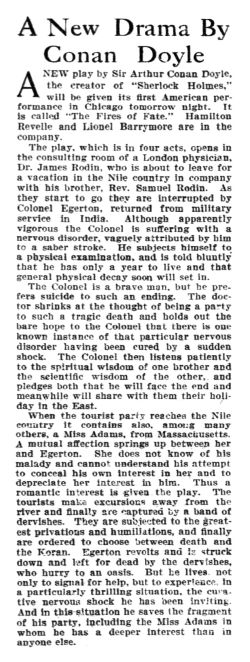A New Drama by Conan Doyle
A New Drama by Conan Doyle is an article published in The Sun (Baltimore) on 5 december 1909.
A New Drama by Conan Doyle

A new play by Sir Arthur Conan Doyle, the creator of "Sherlock Holmes," will be given its first American performance in Chicago tomorrow night. It is called "The Fires of Fate." Hamilton Revelle and Lionel Barrymore are in the company.
The play, which is in four acts, opens in the consulting room of a London physician, Dr. James Rodin, who is about to leave for a vacation in the Nile country in company with his brother, Rev. Samuel Rodin. As they start to go they are interrupted by Colonel Egerton, returned from military service in India. Although apparently vigorous the Colonel is suffering with a nervous disorder, vaguely attributed by him to a saber stroke. He subjects himself to a physical examination, and is told bluntly that he has only a year to live and that general physical decay soon will set in.
The Colonel is a brave man, but he prefers suicide to such an ending. The doctor shrinks at the thought of being a party to such a tragic death and holds out the bare hope to the Colonel that there is one known instance of that particular nervous disorder having been cured by a sudden shock. The Colonel then listens patiently to the spiritual wisdom of one brother and the scientific wisdom of the other, and pledges both that he will face the end and meanwhile will share with them their holiday in the East.
When the tourist party reaches the Nile country it contains also, among many others, a Miss Adams, from Massachusetts. A mutual affection springs up between her and Egerton. She does not know of his malady and cannot understand his attempt to conceal his own interest in her and to depreciate her interest in him. Thus a romantic interest is given the play. The tourists make excursions away from the river and finally are eaptured by a band of dervishes. They are subjeeted to the greatest privations and humiliations, and finally are ordered to choose between death and the Koran. Egerton revolts and if struck down and left for dead by the dervishes, who hurry to an oasis. But he lives, not only to signal for help, but to experience, in a particularly thrilling situation, the curative nervous shock he has been inviting. And in this situation he saves the fragment of his party, including the Miss Adams in whom he has a deeper interest than in anyone else.